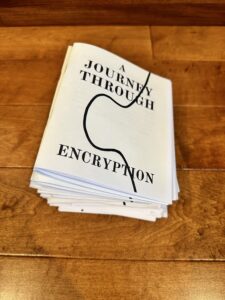Week 10: Final Reflections
Hello everybody!
I can’t believe that I officially wrapped up my senior project this week! At the beginning of the week, I worked on making some more copies of my booklet and played around with different ways of cutting them because I wasn’t completely happy with the way the pages lined up the first time around. While continuing to work on my pamphlets the rest of the week, I also outlined my final presentation and reflected on all that I got to learn about these past ten weeks.
Throughout this entire experience, I got to dip my toes into so many different fields of mathematics, such as abstract algebra, group theory, and number theory. It was an incredible opportunity to see first-hand how often different areas of mathematics intersect with one another to create entirely new disciplines. I’ve already shared the majority of my mathematical research in previous blogs, but I want to use this final blog to touch on the ways in which all of these different algorithms, both historical and contemporary, connect with one another and represent historical trends as well as human curiosity.
On the cryptography timeline, the earliest form of encryption that I studied was Caesar ciphers, in the context of the Enigma machine. The Enigma machine was a form of encryption that came about during WWII as a form of protection for military communication by the Germans, yet just as the Germans were in need of a way to encrypt their communications, the British were determined to find a way to decipher the encryption scheme and use the intercepted messages to their advantage. As a result, the British Bombe machine was built to decipher the messages encrypted by the Enigma machine. This relationship between two parties in which one is always trying to gain an advantage over the other is exactly what drives the evolution of encryption forward. In a way, this type of competition is very similar to that which drives businesses to provide goods and services that rival those of their competitors.
As I moved forward with my research, I found that the accessibility of cryptography meant a call for greater efficiency. While greater accessibility meant the general public could rely on more security when it comes to banking and eventually online data, consumers also want efficiency; they don’t want to be inconvenienced by the very things that keep their information private. This balance between security and efficiency is what drove the implementation of elliptic curve cryptography into smartphones, which perform a multitude of calculations within a compact machine. At the same time, digital attackers are constantly trying to find better ways to break encryption algorithms, which oftentimes results in the eventual inefficiency of an algorithm as keys must continuously become longer and more complex to try and overcome these digital threats.
Interestingly, I also found that for many encryption algorithms, including RSA and the Diffie-Hellman Key Exchange, there isn’t any mathematical proof that there aren’t more efficient ways to crack the algorithms. Essentially, these algorithms are widely used because no one has found a better way up to this point. For this reason, when competitions are held for determining new encryption schemes, such as the competition that resulted in AES and the competitions occurring right now with regards to quantum encryption, mathematicians are attempting to break algorithms just as much as they are trying to come up with new ones. I’m sure we’ve all heard the saying that science is about trying to prove a theory wrong, not about trying to prove it right. I’ve found that this really is true when it comes to cryptography. There simply isn’t an easy way to prove that an encryption algorithm is completely secure; it’s more about finding algorithms that are hard to break. If we could prove that an algorithm is completely and utterly unbreakable, there would be little point in digital attackers spending time trying to break it. There would be no competition or force pushing progress forward.
That brings me to my original research question: how are quantum computers affecting encryption methods? They really aren’t affecting encryption any differently than classical computers or the British Bombe machine once did. They simply happen to be the newest challenge to modern cryptography, pushing mathematicians to make better schemes that are more secure yet still efficient. Sure, the physical nature of quantum computers means that the mathematics behind quantum encryption is different than that of, say, AES, but this isn’t anything surprising either. Like I mentioned at the beginning of this post, cryptography is an intersection of so many fields of mathematics, so the fact that a machine that utilizes quantum mechanics and the behavior of atoms to function also requires the use of quantum mechanics to encrypt data only makes sense.
These patterns are the same ones that push forward motion in all fields, not just encryption or even mathematics. People are curious about the world, and sometimes historical events push humanity to turn curiosity into a tangible advantage. Like I said before, no one wants their adversary to have an advantage, and thus the race for change begins. This idea of persistent evolution is fascinating to me, and I’m so grateful that I’ve had the chance to explore this phenomenon on a very small scale and in a field I really enjoy. What’s really special, though, is that now I get to share my journey and the historical journey I have spent so much time studying with an audience greater than myself. I’m beyond thankful for the support of my mentors and my family, as well as all of the other kind people who were willing to lend me their textbooks and advice. I wouldn’t have ended up where I am now without all of their support. My final presentation will be on Thursday, May 9th, at 5pm at BASIS Prescott! I can’t wait to share my booklet and my experience with the public, and I hope to see some of you there. Thank you again for following along with my journey; I appreciate all of you!

